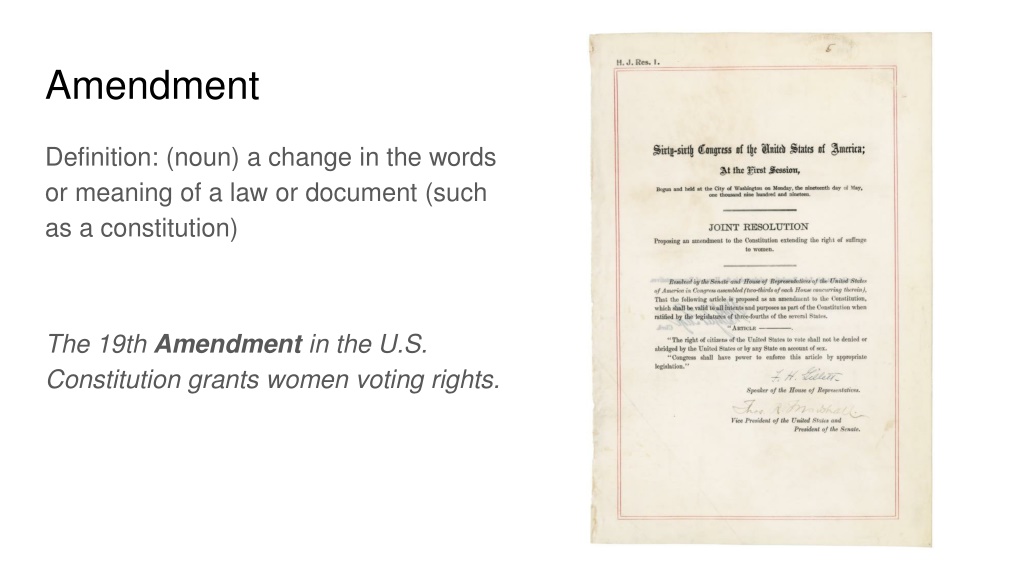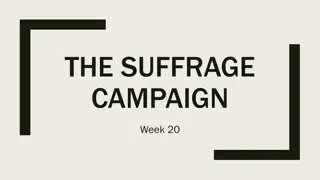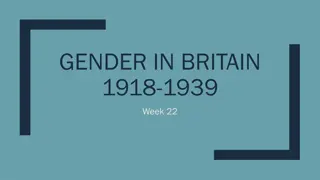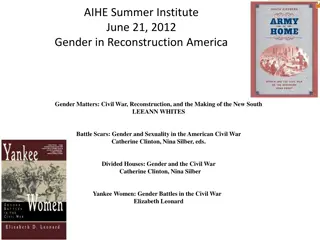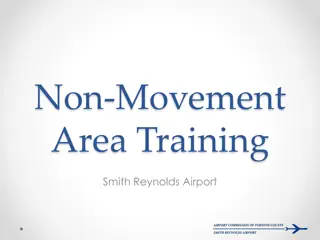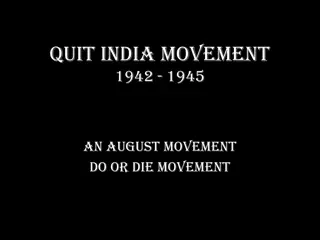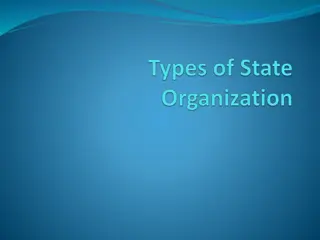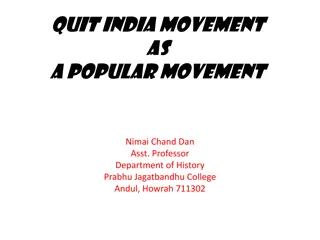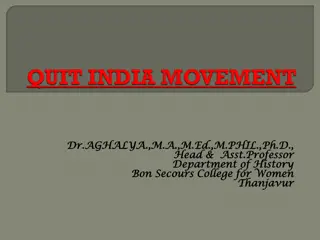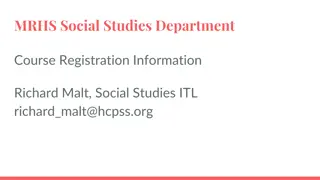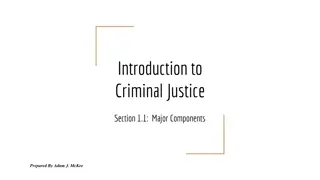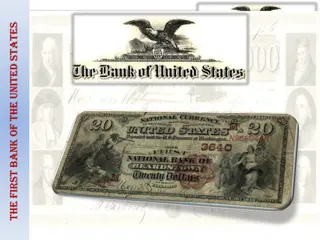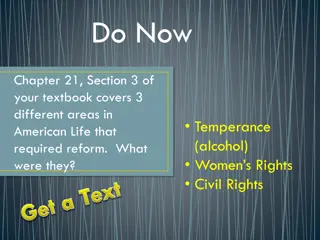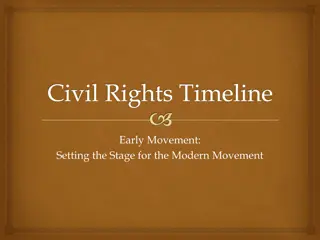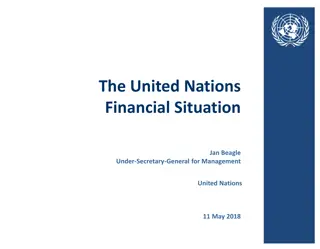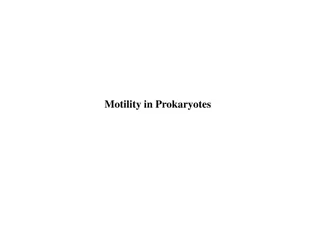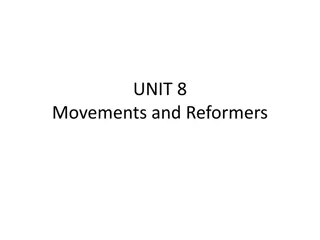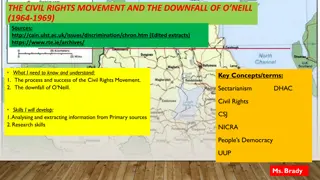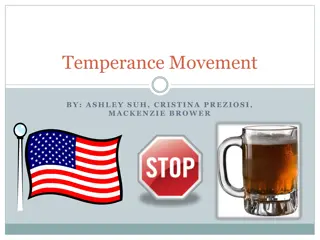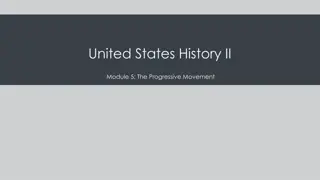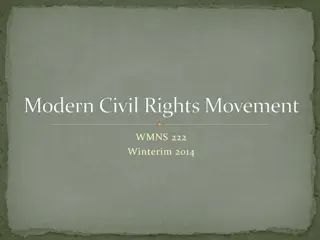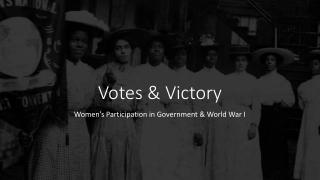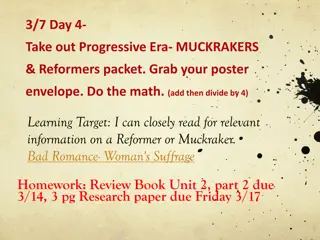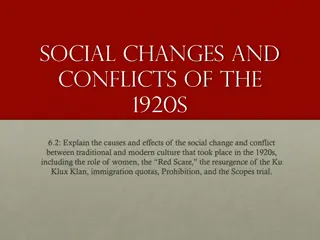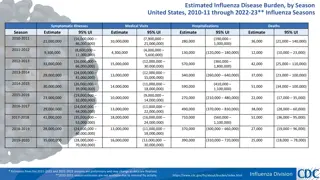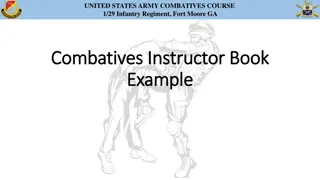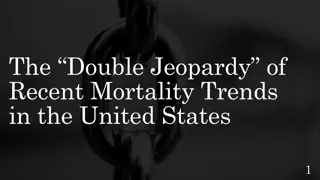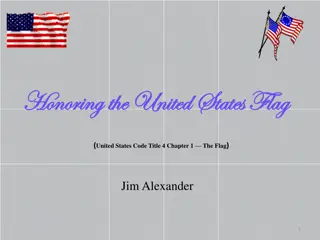Suffrage Movement in the United States
Definition of key terms related to the suffrage movement in the U.S., including Amendment, Ballot, Campaign, Delegate, Franchise, Lobby, Petition, and Ratify. The content describes the significance of the 19th Amendment, granting women the right to vote, and the efforts of suffragists in influencing legislation and public opinion through campaigns, lobbying, and petitions.
Download Presentation

Please find below an Image/Link to download the presentation.
The content on the website is provided AS IS for your information and personal use only. It may not be sold, licensed, or shared on other websites without obtaining consent from the author. Download presentation by click this link. If you encounter any issues during the download, it is possible that the publisher has removed the file from their server.
E N D
Presentation Transcript
Amendment Definition: (noun) a change in the words or meaning of a law or document (such as a constitution) The 19th Amendment in the U.S. Constitution grants women voting rights.
Ballot Definition: (noun) a ticket or piece of paper used to vote Seraph Young was the first woman in the modern United States to cast a legal ballot in an election. Illustration by Brooke Smart
Campaign Definition: (noun) a series of events designed to influence voters in an election Suffragists like Susan B. Anthony led the campaign for women s voting rights. Definition: (verb) to take part in a series of events to influence voters Suffragists campaigned for women s voting rights. Courtesy of Library of Congress.
Delegate Definition: (noun) a representative who votes on behalf of others Susa Young Gates was one of many delegates representing the women of Utah at national suffrage conventions. Susa Young Gates. Courtesy of Utah State Historical Society.
Franchise (noun) the right to vote (a synonym of suffrage, a more formal word choice) The 19th Amendment granted the franchise to women. Also, The franchisement was granted to women by the 19th Amendment. (verb) to give the right to vote The 19th Amendment franchised women.
Lobby Definition: (verb) to try to influence government officials to make decisions for or against something. Suffragists lobbied Congress to grant women s suffrage. Emmeline Wells, leading Utah suffragist (left), with Governor Spry (center) to get his support for a federal women s suffrage amendment on February 16, 1916. Courtesy of Utah State Historical Society.
Petition Definition: (noun) a written document that people sign to show that they want a person or organization to do or change something Suffragists wrote petitions to convince lawmakers to pass a women s suffrage amendment. Definition: (verb) to ask a person, group, or organization for something in a formal way Suffragists petitioned Congress to pass women s suffrage legislation. Suffrage petition to U.S. Congress from American Woman Suffrage Association, 1871. Source: Record Group 233 Records of the U.S. House of Representatives National Archives and Records Administration.
Ratify Definition: (verb) to make official by voting for and signing (a constitutional amendment) In August 1920, the 19th Amendment granting women s voting rights was ratified by three-fourths of the states. The Tennessee Senate voting on the 19th Amendment on August 18, 1920--the 36th and last vote needed to ratify the amendment.
Suffrage Definition: the right to vote in a political election During the women s suffrage movement, women fought for and won the right to vote in political elections.
Suffragist Definition: (noun) a person who worked to get voting rights for women Many Utah women were suffragists who actively fought for suffrage. National and Utah suffragists with Utah Senator Smoot in August 1915. Photo courtesy of National Woman s Party.
Moderates Definition: (noun) People who are assumed to listen to reason; committed to friendly persuasion; push social norms a little, but still within levels of respectability. Carrie Chapman Catt was a leading suffragist who was considered more moderate; she favored continuing to use tactics that had been used during previous decades and keep herself in the good favor of male leaders. Carrie Chapman Catt sometime between 1909 and 1932. Courtesy of Library of Congress.
Radicals or Militants Definition: (noun) People who express greater degrees of dissatisfaction than moderates; they tend to be more combative and push more against social norms and ideas; more extreme. Radicals tend to make moderates look more conservative or acceptable. Alice Paul was considered militant because of her White House protests. Alice Paul. Courtesy of Library of Congress.
